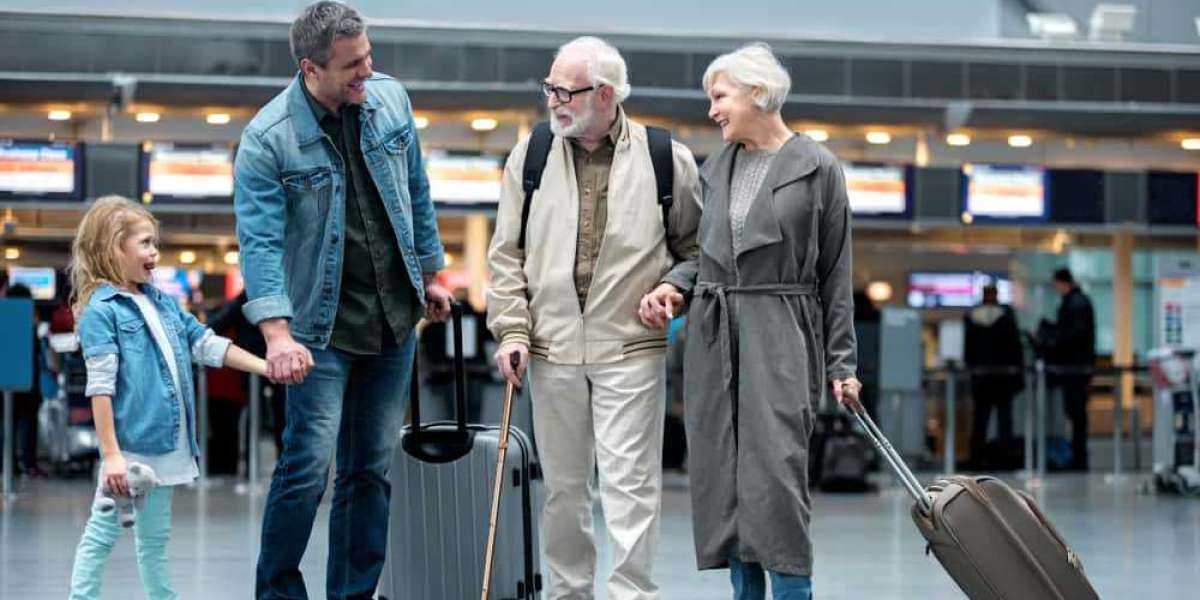Vacationing with your senior parents, grandparents, or other loved ones can be challenging since, as they become older, it becomes more difficult for them to get around and enjoy themselves. Some senior persons have difficulty climbing stairs or walking for lengthy periods of time; others may require the assistance of a cane, walker, or wheelchair to facilitate movement. When it comes to traveling or vacationing, mobility problems might make the process appear frightening. However, if you prepare ahead of time, this does not have to be the case. In reality, merely because you are "older," you should not be prevented from traveling or vacationing together any longer.
Planning early is essential if you want to travel with your elderly loved ones this summer. Review our suggestions for traveling with your elders in the section below, which will make the summer vacation season more enjoyable for everyone!
Making Arrangements for Traveling with Seniors
When traveling with senior individuals, there are a few things to bear in mind that should not be overlooked. Listed below are some recommendations to make your journey more comfortable. Make sure you plan ahead of time and account for any and all of their unique requirements and requirements.
Essentials to Have in Your Bag
If your loved one is going to be sitting in a car or on a plane for a lengthy amount of time, consider purchasing supportive stockings to prevent blood clots and numbness in the legs from forming in their legs. Pack lightweight clothing that may be layered, and have essential medical information with you at all times in case of emergency. Among these are the doctor's contact information, your insurance information, a copy of your medical power of attorney paperwork, and copies of all prescriptions. Medication, food, and water are all other items that should be kept on hand at all times as well.
Consult a medical professional.
Make sure to consult with your doctor to determine whether or not you need to take any special measures for your elderly loved one. In the event that they have a medical problem, they may be given additional instructions. Make sure he or she has the impression that your senior loved one is able to cope with the stress of traveling and the disruption to their daily schedule. Confirm that all drugs have been replenished and that they are in their original containers to facilitate identification.
Before making any travel arrangements for an elderly person, consult with the elder's primary care physician to consider the following issues:
The method(s) of transportation and the location (or locations) of your choice are they acceptable for the senior's skills and limitations?
Does it appear that they require any specific vaccinations?
Is it possible for the doctor to recommend a medicine or a nutritional supplement to aid with anxiety or other behavioral difficulties that may develop?
Is there anything more that the doctor wants you to know or anything else that you should be prepared for?
If you are traveling by car, you should keep in mind the following:
If you are going by bus or vehicle, you may need to make many stops. Some people travel with portable toilets for those long stretches of road, and if your loved one suffers from arthritis or leg cramps, you might want to consider leg wraps for their comfort and convenience. It is also possible to purchase automotive hand bars, which make it simpler to get into and out of the vehicle.
Seniors require frequent stretching, and the break is beneficial to everyone. Make a list of sites of interest where you may stop on a frequent basis before you go on your journey. Make sure that assistive aids such as canes and walkers are conveniently accessible, as well as any medications that may be required.
Advice on Taking a Summer Vacation and Traveling with Seniors
If you are traveling by plane, make sure to bring your passport.
Keep in mind that boarding an airplane may take longer for your loved one if he or she is elderly or has limited mobility, so check with your airline about their boarding regulations for persons with impairments. Take use of the services provided at the airport; a wheelchair can help to relieve weariness and make the experience of traveling through the airport less unpleasant. Make careful to reserve any special services you may require when booking your flight, since they may not be available if you do not do so.
When traveling by plane, you should consider going through security. Wearing simple attire and limiting carry-on baggage is recommended, as is wearing shoes that are simple to put on and take off. As your elders walk through the scanners, be sure to advise the security officer if you have recently had surgery that necessitated the placement of metal implants in your hip, etc.
When booking your travel, it is also a good idea to evaluate not only the cost of the journey, but also the best route in terms of direct flights in order to reduce the amount of time spent changing planes. Choosing a departure time in the middle of the morning or early afternoon can also help to guarantee that senior family members have the most energy throughout the journey.
Make a realistic assessment of your travel plans.
Make sure to organize your travel arrangements properly. Allow your parents to go to bed early if that is their preference. Some activities, such as supper, may allow you and your family members to move at your own pace. There are no laws that say you must spend every second of your holiday together.
Be realistic about how much exercise, walking, and traveling your loved one is capable of doing. Maintain flexibility in your plans in order to accommodate how they are feeling on any given day. If your elderly loved one has restricted mobility, make certain that the vacation will meet his or her specific requirements before booking the trip. Aside from considerations like as mobility and accessibility, it's important to consider their stamina and energy levels. As a result, provide plenty of time between activities for recuperation and don't make the trip too lengthy overall. Traveling and being excited might be exhausting for everyone after a while.
Prescription Drugs and Travel
When flying by flight, all prescription prescriptions must be in containers that have been authorized. You may be required to bring medication in prescription bottles if you are traveling by air. The most convenient method to do so is to pack them in your carry-on along with a plastic baggie with a zipper. Preparing a medical history and prescription list, as well as keeping it with your loved one in case there are any difficulties, can ensure that you have a sufficient supply of drugs on hand. Medication management is always crucial, and it may be a good idea to have a system in place to remind yourself of the dose times of your loved ones' prescription medications.
Personal and medical records are required.
A government passport is considered the greatest form of identification by federal TSA security personnel and is thus recognized as such. Make at least three photocopies of your passport, driver's license, Medicare and insurance cards, trip tickets and itinerary, boarding pass, as well as any prescriptions and/or statements from your physician. One entire set is placed in your parent's hand-carry luggage, one complete set is forwarded to family members at the destination, and one complete set is left at your residence. Request copies of prescriptions and/or statements of medical conditions from each physician and medical treatment center, in addition to other documentation.
Advice on Taking a Summer Vacation and Traveling with Seniors
Seniors' safety, security, and comfort are paramount.
Seniors, particularly in high-traffic places, might be perceived as targets and as being more vulnerable. Encourage your loved ones to refrain from carrying a wallet or a handbag; if they insist on doing so, encourage them to utilize money belts that are worn below their clothing.
Consider purchasing a travel cushion to provide support for the neck and head whether traveling by plane, train, or automobile. Because long-distance travel might be difficult, it is recommended that you dress in comfortable attire. Making sure you have a bottle of water on hand will allow you to stay hydrated and take your meds, and bringing a light snack with you will be beneficial.
Accommodations for the Elderly in Hotels and Other Facilities
Ask for a seat assignment in the rows reserved for handicapped travelers, as well as complimentary wheelchair service at every airport origination, connecting, and arrival point. If there is a dining service available onboard, please notify the reservation system of any dietary restrictions. All of these requests must be made and confirmed at the time of reservation, otherwise the airline, railway or bus company will be under no obligation to make them accessible at check-in or while en route if you do not do so.
Because showering in hotels might be problematic, it is recommended that you bring an inflatable shower seat with you when you travel. In the event that you require hearing aid batteries or denture cream, make sure to take plenty of both in case you run out of supplies. If you are concerned about becoming separated from a loved one, consider purchasing a GPS cell phone.
Advice on Taking a Summer Vacation and Traveling with Seniors
Traveling with a loved one who has Alzheimer's disease or dementia
It is possible that you may need to make some additional preparations and measures if your loved one has Alzheimer's disease or another kind of cognitive impairment.
They should continue with their normal routine.
For persons suffering from dementia, knowing what to expect during the day is essential. It helps them to feel less stressed, anxious, and afraid, but it makes it harder for them to recall new plans. Make every effort to keep mealtimes, bedtimes, and medication routines as similar as feasible to their normal home schedule. Bring along familiar things and pieces of their routine to help them feel more at ease in a new situation, such as a blanket, to reduce the stress of being in a new environment.
Communication
Inform your companion of your whereabouts and what you want to perform before and throughout each activity. Keep in mind that too much information might be overwhelming. If you give someone living with dementia complicated directions or other specifics, this may cause confusion and irritation in them.
Create a Calm and Relaxing Environment
It's best to avoid particularly noisy settings and large groups of people when organizing activities for your loved one if he or she does not cope well with noise or crowds or is overtired. Keep an acute eye out for indicators of worry and agitation, and act accordingly. It is necessary to seek refuge in a calm area if you are experiencing increased disorientation and anger.
Remember That It Is Getting Close to Nighttime
The symptoms of Sundowner's Syndrome might worsen right before the sun sets, therefore it's best not to go outside in the evenings when the sun is starting to set. Before it becomes dark, return to your hotel room and close all of the curtains and switch on all of the lights to eliminate shadows and make the transition from day to night more seamless.
Advice on Taking a Summer Vacation and Traveling with Seniors
Making Memories During Summer Vacations
Aside from all of the aforementioned considerations, simply set aside some time to create memories with your senior loved ones. You never know when traveling away from home may become something they will no longer be able to do, so make the most of the experience while you still have the opportunity.
Traveling and discovering a new place with a loved one may be a lot of effort for the caregiver, but it will bring limitless opportunity to experience the world in a different light for the caregiver and the loved one.



